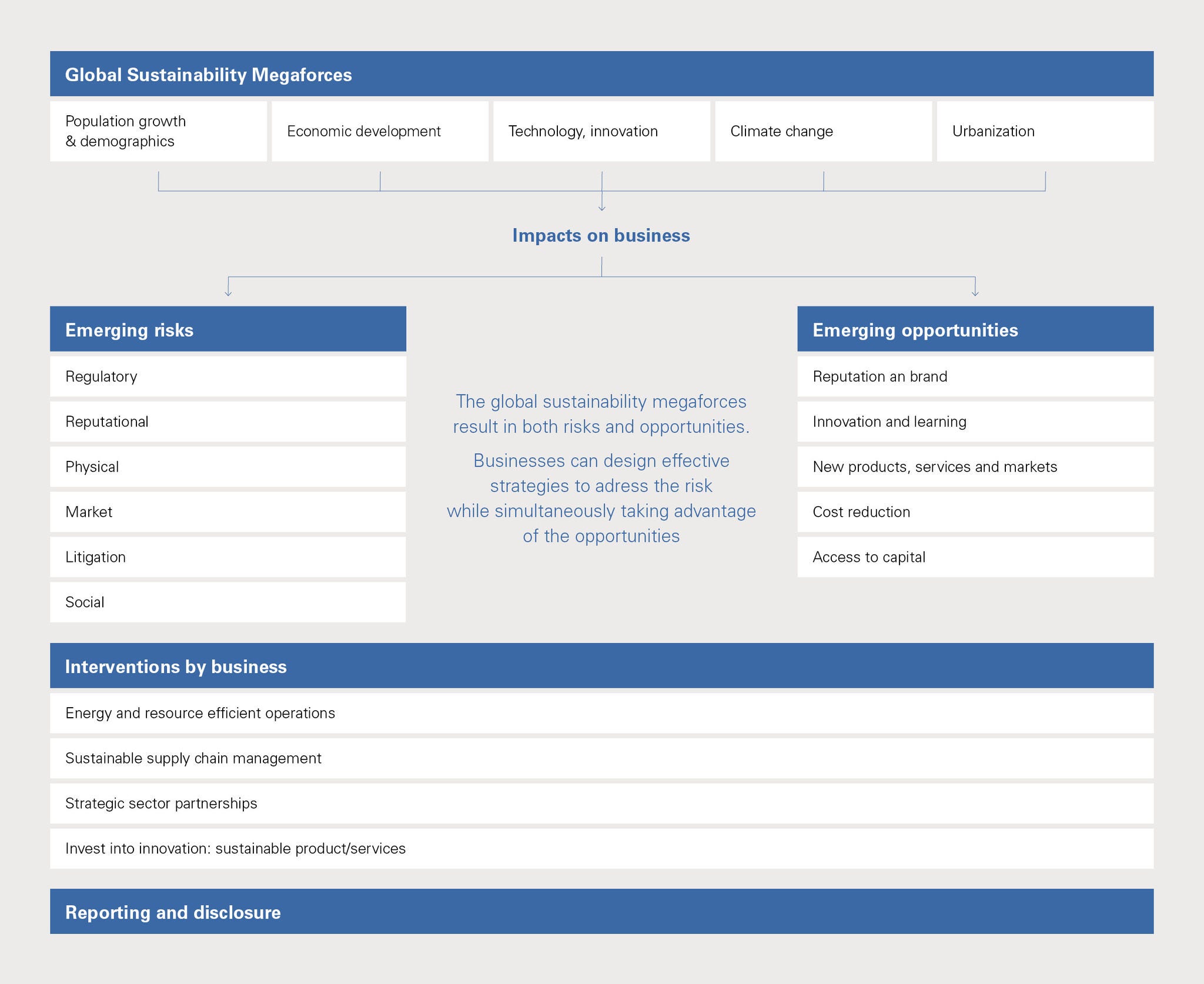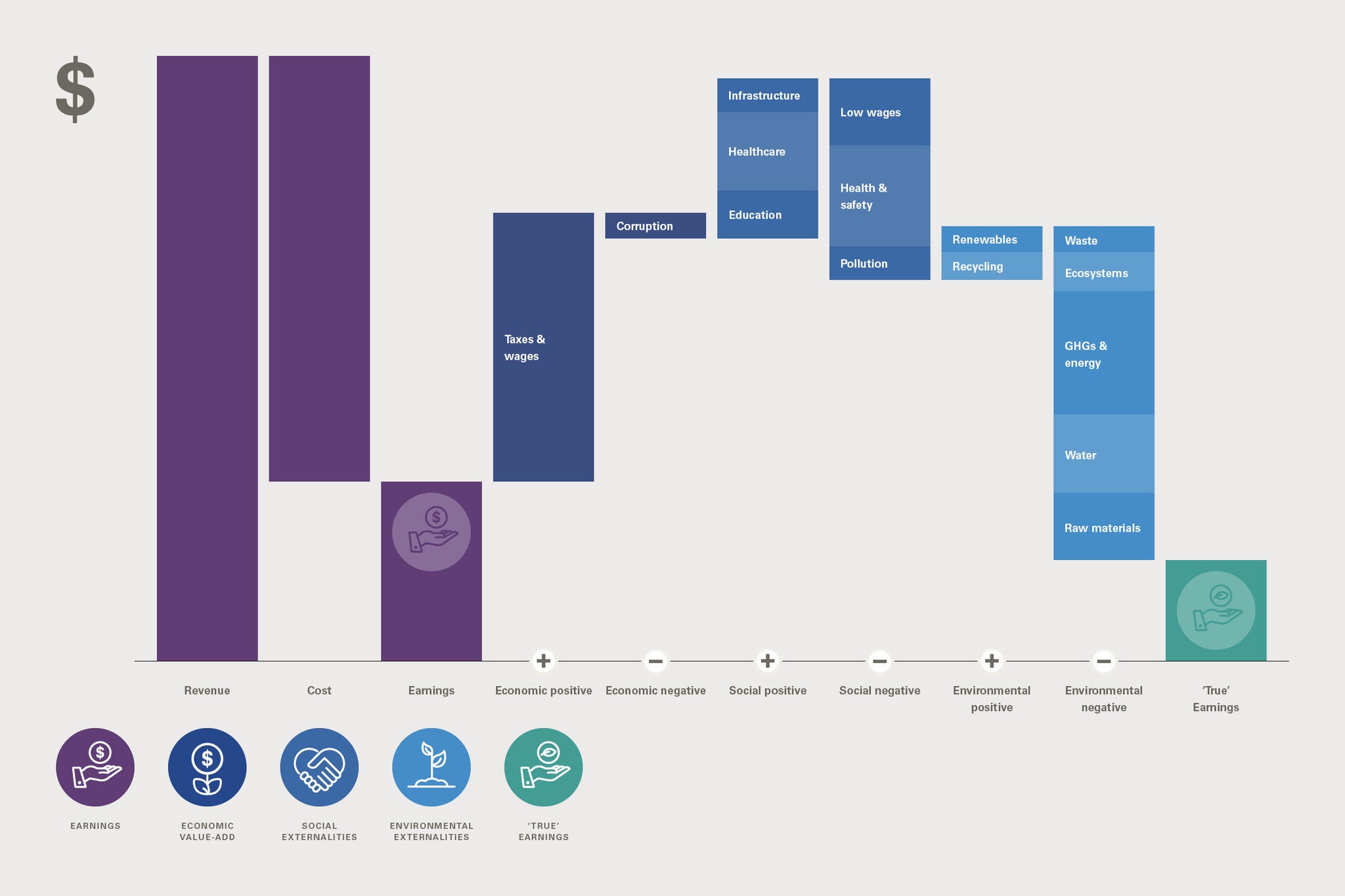Climate change, urbanization, population growth and other global megatrends affect all companies in different ways. As they navigate the resulting risks and opportunities, companies have to challenge their strategies.
In the following sections you will find detailed information on these topics:
Strategic differentiation as an ambition
An effective and credible strategic alignment demands consistent commitment. It also requires companies to adjust the strategic objectives of their core business to the social challenges arising in the context of sustainability. The response is not about increasing philanthropic efforts or launching individual green products, however.
Companies should focus instead on the opportunities that emerge as the environment shifts – and use these to create their own strategic advantages. In doing so, they should be guided by the vision of a world in which the basic needs and equal rights of all are guaranteed within the limits of our planet. As a fundamental idea for the development of the UN Sustainable Development Goals, this vision reflects both societal needs and the direction of political developments.
Companies can contribute to achieving the vision in a variety of ways. For example, they can consistently align their core business with decarbonization efforts in order to counter climate change, or increase their resource efficiency by embracing circular concepts. In many cases, this requires a re-think of the product portfolio. Taking the automotive industry, construction development or energy supply as examples, it is easy to see that there is immense potential for differentiation.
But companies operating in areas such as health care or nutrition can also secure a favorable position by improving the living conditions of their target groups. Of course, this should result in a win-win situation for the environment and the companies. This "shared value" approach aims to ensure that companies are also economically successful by creating social added value, making their realignment worthwhile.
How do you put this vision into practice?

Magali Anderson in a discussion with KPMG representative Silvan Jurt, Partner and Head Corporate Sustainability Services.
Holcim has an ambitious strategy to a net zero future for people and the planet. What are the key ingredients to implement such a strategy successfully and how does Holcim prioritize its actions? Why is circularity a key lever of this journey and how to achieve the goal of recycling 100 million tons of materials by 2030? Magali Anderson shares her insights and talks about her take-aways from COP26.
Full commitment to holistic integration
To fundamentally realign and anchor the idea of sustainability in the company, leadership must be behind the decision and the vision needs to be embedded holistically throughout the company. It means that the objective serves as a basis for decision making in product development, purchasing and production and is supported by integration into the governance framework, controlling and financial incentive systems.
Integration into risk (and opportunity) management is also essential. If, for example, the water supply at production sites is restricted by increased droughts, it is important to determine the effect on the supply capability of the company concerned. Will increasing physical risks have an impact on suppliers, and is the company sufficiently robust? There is no doubt that risk management needs to evolve to take account of the characteristics of such megatrends.
A consistent focus on social challenges also means that a company addresses the needs of its key stakeholders – such as customers, investors or employees.
Developing a contemporary strategy therefore also requires ongoing exchange with the various stakeholders so that changes can be integrated from both an internal and external perspective and the company can align itself with all relevant interests and needs.
Accounting is a key to success
Credible sustainability strategies create added value – for society and the companies themselves. And it can be measured. To do so, accounting teams are called upon to explore on new paths.
In the future, managing environmental and social capital will have to be included in strategic decisions, especially the effects of corporate activities, which used to be viewed in terms of external impact but are now increasingly considered internally. A good example of this is carbon pricing, which makes corporate emissions more expensive. In the past, they played an insignificant role in corporate decision making because of their low financial cost to companies – despite their high social cost and environmental impact.
However, with increasing internalization, this external factor makes more of a mark on the income statement, causing it to be become part of the decision-making process. Some companies with high emissions have anticipated this development at an early stage and, for example, incorporated shadow pricing. But other corporate impacts affect the environment and society beyond the boundaries of the company and can even be quantified in monetary terms. Organizations such as the Value Balancing Alliance are working on standardization.
The financial consequences of internalizing such social values can be derived from appropriate analysis and consideration of regulatory changes, market dynamics and changing stakeholder demands. In turn, strategic initiatives and measures, but also capital allocation and financing, can be better justified and a long-term view integrated into decision making, taking environmental and social aspects into account. This kind of monetization can help incorporate non-financial aspects into both decision-making and strategy development, making it an increasingly invaluable and popular tool. It is a crucial tool for linking economic considerations with environmental and social impacts.





